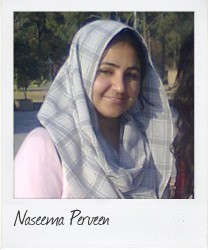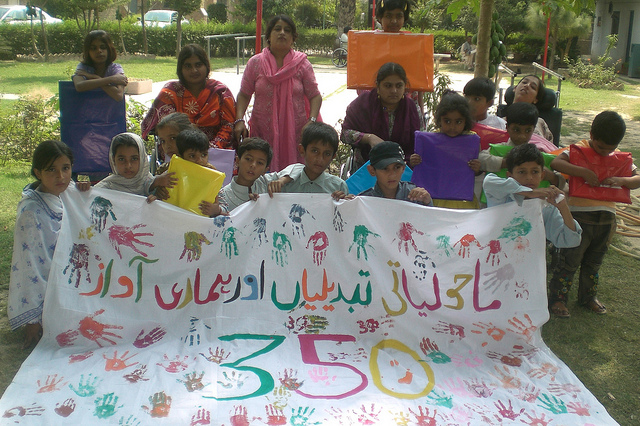“The success of a nation can depend on the role of civil society”
March 4th, 2013 Citizens working together as a civil society can have an impact on development even in nations with fragile governance, writes Naseema Perveen, 21, of Islamabad in Pakistan. A first step is to promote education.
Citizens working together as a civil society can have an impact on development even in nations with fragile governance, writes Naseema Perveen, 21, of Islamabad in Pakistan. A first step is to promote education.
Civil society could have momentous impact on development, especially in states where the government is fragile. By pooling resources and mobilizing all the resources possible, it can play an important part in advancing social development.
There are various examples in the world where nations having fragile governance still made extraordinary progress. This can only be done when the people come together for a common cause or for a common economic purpose to build a sound foundation for development. Resource mobilization is what actually matters in any society.
The definition of development lies in the basic facts that can be determined about a state – that food security exists, how many of the children go to school, and how many people flee from fear, because fear is one of the most important factors in driving some societies. These are the indicators that depict the overall standard of the social setup. Getting together to achieve these goals will result in social as well as economic development and promote pluralism as a strength. Let us fight for the hope, aspiration and quality of life. The success of a nation can depend on how large a role civil society can play in the development of its society.
Past is a bygone, present is where we stand, but what actually matters is the future of a nation. That future is totally dependent upon the future leaders of the country. Our nation is going to be in the hands those kids who cry for education, support and food security today. Let’s save them and save the future of the nation.
According to one rough estimate, the literacy rate in Gilgit-Baltistan, northern Pakistan, is said to be about 90 per cent. It is rated as one of the developed areas of the country, but according to a survey done by The Milky Way Foundation this year the reality is different. It has been found that unfortunately thousands of the children still do not have access to education. Due to poverty they have ended up as child labourers rather than as students. Child labour is a deadly virus. That fact needs to be understood by policy makers, professionals and students because these kids are going to define our future. Children are the future of the nation, so we must save the children and save the future.
The Milky Way Foundation, a youth-led organization, is working in Gilgit-Baltistan trying to make education accessible to everyone irrespective of faith, creed and caste. The goal is to not only to save the future of the children, but the future of the region and the future of the country. It does not mean helping just an individual, but repositioning an entire family in society. Being a part of The Milky Way, I request all the students, professions and the citizens of the Gilgit-Baltistan to come forward to serve our region. University chapters have been established to involve youth for this worthy cause, so students can join The Milky Way and serve your region. Be a part of the noble cause; it is all about you and for the future of your nation. Let’s fight for the common cause, fight for the hope, aspiration and a quality life because this is how we can build a sound foundation for development. Together we can make a difference, and that is where civil society comes into play.
photo credit: <a href=”http://www.flickr.com/photos/350org/5068974720/”>350.org</a> via <a href=”http://photopin.com”>photopin</a> <a href=”http://creativecommons.org/licenses/by-nc-sa/2.0/”>cc</a>
…………………………………………………………………………………………………………………
About me:
I am blogger, writer, and a social person; I am a responsible, trust-worthy and friendly person. My aim in writing is to address social issues, many of which remain unnoticed.
Currently I am a student of Economics, aspiring to make my career in social development as a social worker. I have passion to work with people from all walks of life and believe social development is only possible through common effort and consultation.
…………………………………………………………………………………………………………………
Opinions expressed in this article are those of the author and do not necessarily represent the views of the Commonwealth Youth Programme. Articles are published in a spirit of dialogue, respect and understanding. If you disagree, why not submit a response?
To learn more about becoming a Commonwealth Correspondent please visit: http://www.yourcommonwealth.org/submit-articles/commonwealthcorrespondents/
…………………………………………………………………………………………………………………




